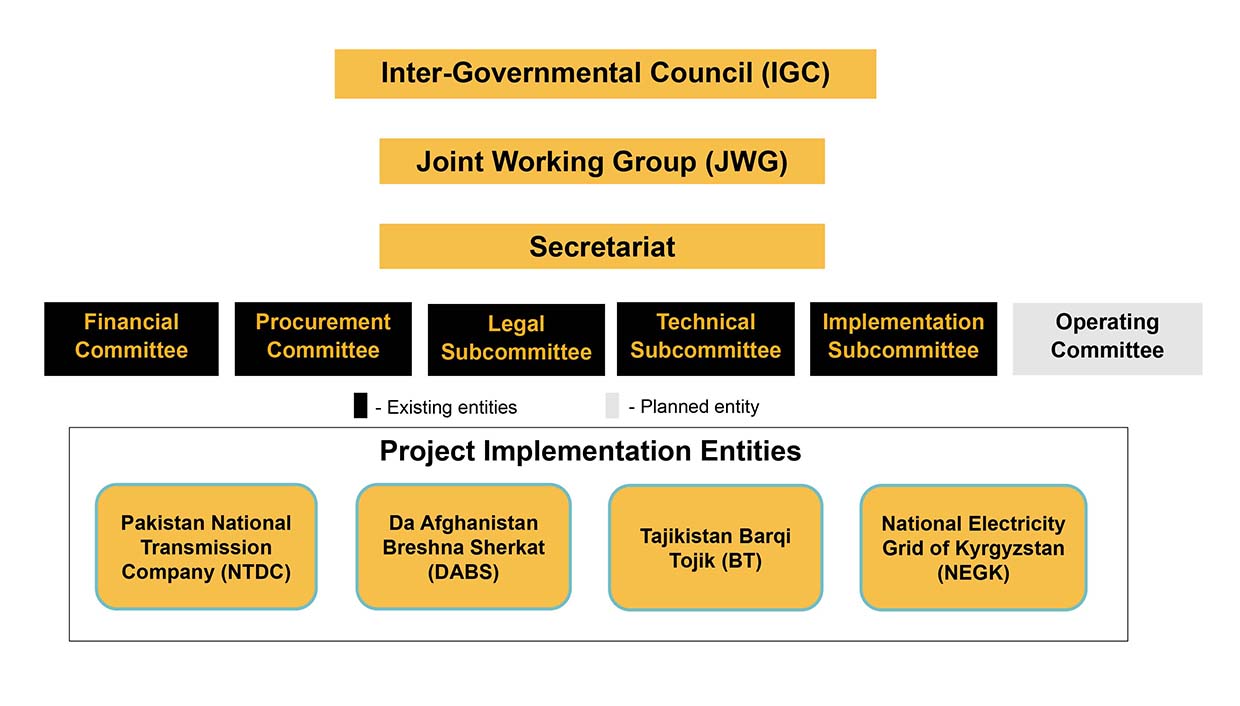CASA-1000 Cooperation and Governance

Cooperation and Governance
The original agreements supporting CASA-1000 demonstrate landmark cooperation among Kyrgyzstan, Tajikistan, Pakistan, and Afghanistan. These agreements helped establish the main governing body of CASA-1000 known as the Inter-Governmental Council (IGC). To support the IGC in furthering project development, the IGC established the CASA-1000 Secretariat. The Secretariat supports member countries to cooperate in the interest of achieving shared development goals. The member countries, through the Secretariat, coordinate planning and project implementation activities, construction, and commercial operations, keeping key funding institutions informed of all progress.
Project Organization and Governance

Inter-Governmental Council
The governing body of CASA-1000, established in 2007 by the four CASA-1000 countries, is the Inter-Governmental Council (IGC). The IGC, comprised of ministerial-level representatives, is responsible for making decisions necessary for the realization and subsequent operation of the CASA-1000 Transmission Project. Previous decisions by the IGC determined the present structure of the Project, which includes key legal documents designed to develop, construct, operate, and maintain the Project. Some of these documents include the Master Agreement among the National Transmission Companies, foundational power purchase agreements (PPAs), specific government guarantees relating to the project and the host government agreements. These “Core Project Agreements” define the general framework of the CASA-1000 Project.
Several coordinating and decision-making bodies have been established to support the work of the IGC including a Joint Working Group (JWG) committee comprised of deputy ministerial-level representatives.

IGС Secretariat
The IGC established the Secretariat in 2008 to support the development and implementation of CASA-1000. The Secretariat acts on behalf of the four CASA-1000 countries to assist in managing diverse aspects of the Project. The Secretariat has been funded since 2011 by the United States Agency for International Development (USAID). This aid is provided by the American people in support of the four CASA-1000 Countries.
The Secretariat helps coordinate communications between all project stakeholders and helps facilitate the work of working groups and committees on behalf of the IGC. Besides the IGC, the Secretariat supports the JWG, the Legal Subcommittee, Procurement Committee, Finance Committee and Technical Committee, Implementation Subcommittee, and in the future, Operating Committee. In addition to these committees, the Secretariat works closely with the national transmission companies in all four countries: the “National Electric Grid of Kyrgyzstan” (NESK), with “Barqi Tojik” in Tajikistan, with the “Da Afghanistan Breshna Sherkat” (DABS), and with the “National Transmission and Despatch Company” (NTDC) in Pakistan.

History of CASA-1000 Project
The CASA-1000 Project began in 2006 with discussions among the four CASA-1000 governments around designing an electricity transmission system to trade power between the regions. This led to efforts to structure engineering and financial arrangements to enter agreements to finance and build the CASA-1000 system. After the establishment of the IGC in 2007, the CASA-1000 governments worked with funding institutions to establish the technical and financial feasibility of the project. The next phases included formally structuring the Project through the IGC and then initiating tendering and finalizing construction contracts. Construction began on the ground in 2018.

